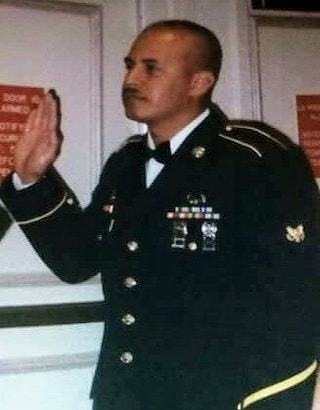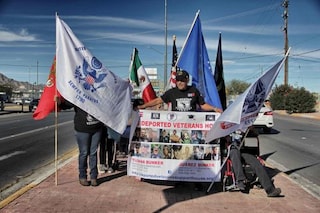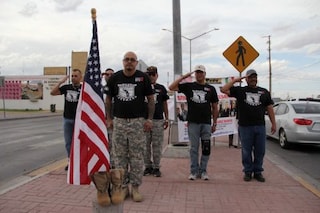Deported Veterans
U.S. military veterans who have been deported to Mexico are seen honoring fallen soldiers on Memorial Day in Juarez, Mexico. (Herika Martinez/AFP/Getty Images)
By Kristine Phillips
November 16, 2017
The men stood on a concrete island in the middle of Cordova International Bridge, where people leaving the Mexican city of Juarez cross the border to El Paso.
It was Memorial Day, when U.S. soldiers honor fallen service members by kneeling in front of a battlefield memorial — a symbolic cross formed with the soldier’s helmet, rifle, boots and, sometimes, dog tags.
The six men standing a few miles from the U.S.-Mexico border did the same May 29, albeit a bit differently: They didn’t have a helmet or a rifle, so they improvised using a U.S. flag perched on a concrete cylinder. A pair of desert combat boots was also on the concrete block.
“The boots represent the soldiers that are not here with us no more, the missing soldiers,” Ivan Ocon said.
Ocon stood at the front of the group that day, with both hands to his sides as he stared into the distance.
The other men lined up horizontally behind him, saluting.
Together, the men paid homage to fallen U.S. soldiers while wearing black T-shirts that described who they are: “Deported Veterans.”
That stirring gesture was captured by Juarez-based photojournalist Herika Martinez, who only had seconds to take the picture.
“The moment they performed the honors was very fast … I could barely take a few pictures before they took their flag again and saved it to go home,” Martinez recalled this week.
The picture, distributed by Agence France-Presse, immediately went viral.
It resurfaced on Veterans Day, when some social media users appeared to be dismayed that veterans can be exiled from the country they had sworn to serve.
Indeed, deportations of veterans, which began decades ago, are often a shock to many who assume that joining the military has always been an automatic guarantee of citizenship.
It isn’t, although previous administrations have taken steps to make it easier for foreign-born soldiers to be naturalized. Under President Trump, new regulations extend the waiting period for military green-card holders to become naturalized citizens.
The Army also has stopped enlisting some immigrants who are legal permanent residents while mandating lengthy delays for others.
[‘It looks like we’re afraid of foreigners’: Army turns away some green-card holders]
Ocon, a 40-year-old native of Mexico, told The Washington Post that he served in the Army for seven years, and spent a few months in Iraq. The Pentagon has not verified Ocon’s service to The Post, but Ocon provided a picture of himself during a reenlistment ceremony in 2001.

He said he was deported a year and a half ago, losing his legal status after he was charged with a crime for not reporting to authorities that his brother had kidnapped someone.
Court records show that Ocon was indicted on several charges in 2006, including conspiracy to kidnap and aiding and abetting. He pleaded guilty and spent nearly 10 years in federal prison.
In 2016, shortly after serving his prison sentence, Ocon was sent back to Mexico, a country he left when he was 7.
He has been living in Juarez since, in an apartment close to the border, and can see the United States from his window.
Ocon said he considers America his home — specifically, Las Cruces, N.M., where he grew up, went to high school and left behind a daughter who’s now 14. For Francisco Lopez, who was standing right behind Ocon in the picture, home is Wichita Falls, Tex., where his children and grandchildren live.
“Right here, you’re basically isolated; you’re alone,” Ocon said. “All your friends and family you grew up with are all in the States. Everybody you know from your childhood are all there. That one mistake is who you are for the rest of your life. You can never prove you’re a good person.”
But Lopez, who turns 73 this month, has been living in Juarez for far longer than Ocon. He was deported in 2003, after serving nine years in federal prison for drug charges. His service record could not be immediately verified, but Lopez said he served for two years in the military in the late 1960s, including a year in Vietnam.
“I thought I was an American citizen,” he said. “I like to go home. I like to go back.”
[Deported veterans: Banished for committing crimes after serving in U.S. military]
As the picture of Ocon, Lopez and the four other men spread on social media over the weekend, a former White House official was struck by its message.
“I can’t believe ‘deported veterans’ is an actual phrase,” Tony Fratto tweeted. His observation struck a nerve, generating more than 100,000 retweets and another 200,000 likes.
Fratto, a former Treasury and White House official in the George W. Bush administration, said in an interview that he was struck by “the juxtaposition of those words together, just two words that didn’t belong next to each other. Everybody knows that the immigrant community plays such a big role in our armed services.”
He added: “If you take the oath of service, to me you’re taking the oath of citizenship. It should be easy and even automatic.”
Others see it differently.
“We hold all military veterans in high regard, but if following our nation’s laws is a requirement for any guest to remain in our country, then that’s the law,” a spokesman for the nation’s largest veteran group, the Veterans of Foreign Wars, once told The Post. “An honorable discharge is not a free pass.”
It’s unclear how many veterans have been deported; U.S. officials do not keep track of such figures.
But more than 500,000 foreign-born U.S. veterans lived in the country in 2016, according to the Migration Policy Institute. That’s 3 percent of the nearly 19 million veterans in the country.
Since October 2001, more than 100,000 military members have become naturalized citizens, according to U.S. Citizenship and Immigration Services.
[He served in Vietnam. His HOA just ordered him to remove an American flag from his mailbox.]
Foreign members of the U.S. military can apply for citizenship through a policy enacted by President George W. Bush after the Sept. 11, 2001, terrorist attacks. A 2009 program awarded fast-tracked citizenship to foreign soldiers and their spouses during basic training. Many immigrants, like Ocon, joined and left the military before the 2009 program was in place — and were charged with crimes after returning to civilian life.
Ocon helps run a support house for deported veterans in Juarez. The day the AFP photo was taken, he was handing out fliers and pamphlets to people crossing to the United States.
The Deported Veterans Support House was started in Tijuana in 2013 by Hector Barajas, another deported veteran.
The Juarez location was opened this year, Ocon said. There are now about two dozen deported veterans in Juarez.
Overall, the support house has been in contact with more than 100 former U.S. service members who have been deported to more than 30 countries around the world, according to its website.
For years, deported veterans have received little to no attention in Washington, where politicians are less likely to support convicted criminals. The Trump administration’s hard-line immigration policy has steered the debate toward cutting legal immigration, creating a border wall and imposing travel restrictions on people from predominantly Muslim countries.
[The Iraq War veteran who lied his way to a Purple Heart and $750,000]
Margaret Stock, a retired Army officer and an Anchorage-based immigration lawyer, said veteran deportations appear to be happening more frequently under Trump, though the Obama administration also deported some military veterans.
Stock said she has seen a growing movement to try to bring deported veterans back to the United States, but it has not resulted in concrete action.
On Capitol Hill, legislation that would create a pathway for deported veterans back to the United States has stalled. The Veterans Visa and Protection Act, which would require the Department of Homeland Security to create a program that allows deported veterans to return to the country legally and cancels the removal of those facing deportation, has sat in the House since it was introduced in March. It’s backed by 60 lawmakers, all Democrats.
The Post reported last summer that the Pentagon was considering a plan to cancel the enlistment contracts of 1,000 foreign-born recruits without legal immigration status, knowingly exposing them to deportation. An undated Defense Department memo, prepared for Defense Secretary Jim Mattis by personnel and intelligence officials at the Pentagon and obtained by The Post, describes potential security threats of immigrants recruited in a program designed to award fast-tracked citizenship in exchange for urgently needed medical and language skills.
The program was suspended last year, and additional security measures were put in place to guard against “espionage potential” among U.S. military recruits born in other countries. In October, however, Mattis said he supports reactivating the program — a sign that Defense Department leaders have backed away from the recommendations of the memo.
On Veterans Day, as the deported veterans photo from May began to go viral again, some of the men in Juarez went back to that same median along the Cordova International Bridge to protest.
This time, there was more than one flag.
A U.S. flag was next to Mexico’s. There were Coast Guard and Army flags, too — and a banner showing pictures of several veterans, along with a message: “BRING DEPORTED VETERANS HOME.”

U.S. military veterans who have been deported to Mexico are photographed on Veterans Day in Juarez. (Herika Martinez/AFP/Getty Images)
Kevin Sullivan and Alex Horton contributed to this report.






